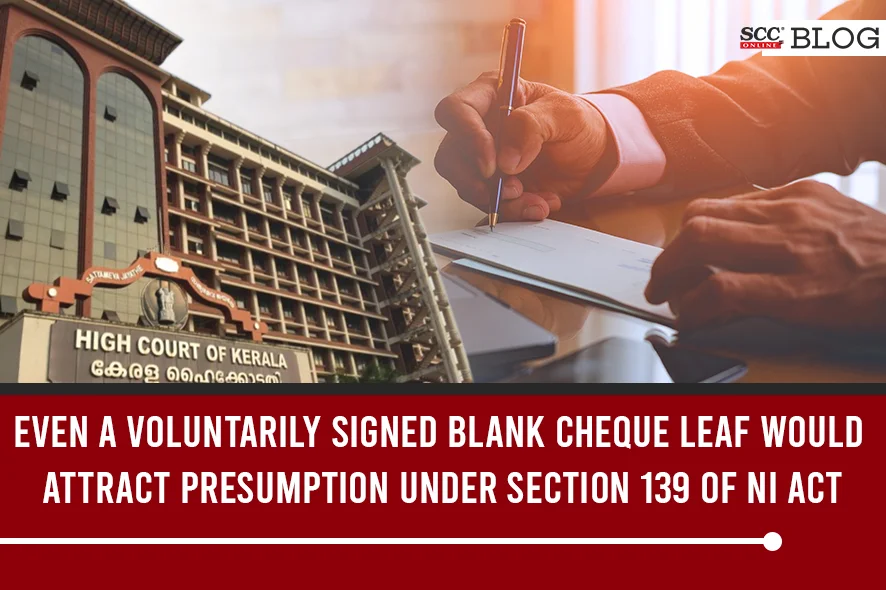Kerala High Court: The instant petition challenged the decision of Sessions Court upholding conviction under Section 138 of Negotiable Instruments Act, 1881 (‘NI Act’) while reducing the substantive sentence to one day, Sophy Thomas, J. upheld the High Court’s findings and clarified that a blank cheque signed without any threat or coercion would be attract presumption under section 139 of NI Act.
Factual Background
The original complaint stated that the revision petitioner borrowed Rs 4 lakhs from the complainant on 27-09-2006 and issued a cheque on 13-10-2006 towards the discharge of debt, assuring sufficient funds in his bank account for honouring the same. When the said cheque was presented before the drawee bank, it was dishonoured due to insufficiency of funds, returned with memo dated 17-10-2006. The said fact led the complainant to send a legal notice for cheque dishonour at his place of business and residence, intimating dishonour and demanding the said amount, which he failed to repay and therefore, a complaint under Section 138 of NI Act was filed.
In the absence of any defence evidence, the Trial Court found the revision petitioner guilty under Section 138 of NI Act and sentenced him to undergo simple imprisonment for 6 months and pay compensation of Rs. 4 lakhs with interest @9% p.a. The Appellate Court confirmed his conviction but reduced the substantive sentence to imprisonment till rising of court and the compensation amount was converted into fine amount, with direction for the fine amount to be paid to the complainant as compensation under Section 357(1) of the Criminal Procedure Code, 1973. The same was assailed in the instant revision petition.
Revisional Jurisdiction of High Court
The Court in the instant matter clarified that while exercising revisional jurisdiction under Section 401 r.w. Section 397 of CrPC, it was “exercising its supervisory jurisdiction for correcting miscarriage of justice, after verifying the correctness, legality or propriety of the finding sentence or order of the courts below, and neither it can be equated with the power of an appellate court, nor it can be treated as a second appellate jurisdiction.” It said that the limited power under the revisional jurisdiction was to do justice as per the principles of criminal jurisprudence and won’t re-appreciate evidence for a contrary finding based on its own conclusions unless a glaring feature was brought to the Court’s notice tantamounting to gross miscarriage of justice.
Allegations of blank cheque with signature misuse case
The main reason for revision petition was the contention that the said cheque was not issued for discharging any legally enforceable debt but that he had availed a vehicle loan from the financial institution run by the respondent and some blank documents were signed by him which also included a blank cheque, and that the rest of documents were returned except the cheque, saying that the same got misplaced. The Court highlighted that the revision petitioner did not produce any document to prove that the respondent was running a financial institution, or document to prove availing a vehicle loan. The Court therefore rejected the contention regarding issuance of cheque for availing vehicle loan. The Court further perused the evidence which showed payment of amount of Rs 4 lakhs by cheque.
While the revision petition contended that although the cheque was signed by him, it was given as a blank cheque, as a security for the vehicle loan availed by him, which was allegedly filled by the respondent in a different ink in a different handwriting. The Court referred to Bir Singh v. Mukesh Kumar, (2019) 4 SCC 197 wherein, the Court held that “when a signed blank cheque is voluntarily given to a payee, towards some payment, the payee may fill up the amount and other particulars, and that will not invalidate the cheque.” The Court clarified that the onus to rebut presumption under Section 139 of NI Act regarding issuance of cheque to discharge a debt or liability was upon the revision petitioner.
Court’s Clarification on pre-signed blank cheque
The Court explained that “Even if a blank cheque leaf is voluntarily signed and handed over by the accused, towards some payment, it would attract the presumption under Section 139 of the N.I Act, in the absence of any cogent evidence to show that the cheque was not issued in discharge of a debt.” The Court further pointed towards the revision petitioner’s failure to adduce any cogent evidence to prove that the cheque in question was not aimed at discharging any legally enforceable debt since the same was given voluntarily and not under any threat or coercion, the Court rejected the contentions surrounding vehicle loan.
The Court further referred to Asraf Ali v. State of Assam, (2008) 16 SCC 328 regarding examination under Section 313 of CrPC to clarify the mode of payment may be a circumstance to challenge the genuineness of transaction, but the same could not be treated as an incriminating circumstance brought out against the revision petitioner and the Section 313 examination would not vitiate the trial.
The Court therefore dismissed the instant petition and upheld the impugned judgment, and directed the revision petitioner to surrender before the Trial Court on or before 28-11-2023.
[P.K. Uthuppu v. N.J. Varghese, Criminal Revision Petition No. 1374 of 2010, Order dated 7-11-2023]
Advocates who appeared in this case :
For Petitioner: Advocate S. Rajeev
For Respondent: Advocate R. Bindu Sasthamangalam, Senior Public Prosecutor Renjit George








